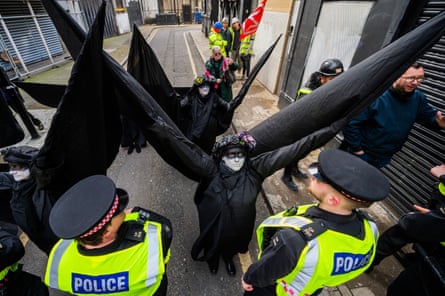What next for climate activism now Just Stop Oil is ‘hanging up the hi-vis’?
After three years, thousands of arrests and a state crackdown on protests, the group is ending direct action after a polarising campaign
On the morning of Valentine’s Day 2022, Hannah Hunt stood at the gates of Downing Street to announce the start of a new kind of climate campaign, one that would eschew mere protest and instead move into “civil resistance”.
Last week, three years and thousands of arrests later, in a neat tie-up exemplary of Just Stop Oil’s (JSO) love of media-savvy stunts, Hunt went to the same spot again – this time to announce the group would be “hanging up the hi-vis”.
In the history of UK climate activism, there has been perhaps no more polarising a campaign. Derided as “eco-zealots” in the Daily Mail and condemned as “selfish” by the Sun, which even sent a reporter to testify against them in court, JSO is as likely to be remembered for the chaos it caused as for its victories.
The group’s tactics of blocking roads, halting sports events and targeting national treasures enraged politicians, pundits and the public alike. By 2023, polling showed 64% of people disapproved of JSO.
Just Stop Oil activists interrupt Sigourney Weaver performance in The Tempest – video
Despite the demonisation, the impact of this relatively small group of peaceful protesters is in little doubt. Its campaigners kept the issue of new fossil fuel production on the agenda of even the least environmentally minded news outlets.
Indeed in the group’s parting statement, members claimed to have been “one of the most successful civil resistance campaigns in recent history”, saying that their key demand for a moratorium on new oil and gas licences was “now government policy”.
And perhaps more significantly, JSO proved there was a group of people in the UK prepared to endure public opprobrium – and often prison – to raise the alarm about a crisis that experts warn threatens the future of humanity. So why stop now?
For Graeme Hayes, a sociologist at Aston University, who has spent years covering Just Stop Oil, the end of the campaign came as no surprise. It followed the same pattern as its forerunners, Extinction Rebellion (XR) and Insulate Britain.
“It is in the DNA of these organisations that they do not carry on long term,” Hayes said. “Not least because the people involved, even in the best of worlds, tend to find that they exhaust their energies, that the constant wider social conflict they face is intense and takes its toll.”
 View image in fullscreenJSO activists outside Harrods department store in Knightsbridge, London. Photograph: Ian West/PA
View image in fullscreenJSO activists outside Harrods department store in Knightsbridge, London. Photograph: Ian West/PAThat wider social impact has been intensified by the introduction of some of the most draconian laws around the right to protest in UK history. In 2022, MPs passed the Police, Crime, Sentencing and Courts Act, a direct response to XR’s mass protests, giving police an armoury of new powers to impose conditions on demonstrations.
The following year, in a direct response to the likes of JSO, parliament passed the Public Order Act, creating a series of offences targeting direct action, as the government simultaneously lowered the threshold of disruption at which police could intervene in a protest from “serious” to “more than minor”.
At the same time, courts are handing down increasingly harsh sentences, prosecutors have sought more severe conspiracy charges, and the government has taken action in the courts to narrow the scope of defences available to protesters.
Katy Watts, a lawyer at the human rights organisation Liberty, said: “That has all created this climate in which it is harder to engage in protest, particularly some of those specific direct action tactics. It’s harder to lawfully demonstrate on the streets, and the penalties or the consequences for committing protest offences have become more and more severe.”
The cost to activists has been substantial. According to JSO’s data, over three years their supporters were arrested about 3,300 times. Seven are serving jail sentences, of up to four years, and a further eight are on remand awaiting sentencing. “We think there have been 180 instances of remand and/or prison sentences handed down,” a JSO spokesperson said.skip past newsletter promotion
Sign up to Down to Earth
Free weekly newsletter
The planet's most important stories. Get all the week's environment news - the good, the bad and the essential
Enter your email address
Sign up
Privacy Notice: Newsletters may contain info about charities, online ads, and content funded by outside parties. For more information see our Privacy Policy. We use Google reCaptcha to protect our website and the Google Privacy Policy and Terms of Service apply.
after newsletter promotion
 View image in fullscreenRoger Hallam says climate activists are facing the most repressive laws in modern UK history. Photograph: Ollie Millington/Getty Images
View image in fullscreenRoger Hallam says climate activists are facing the most repressive laws in modern UK history. Photograph: Ollie Millington/Getty ImagesMore may yet be sent to jail. Trials for JSO actions are scheduled through 2025 and 2026 and, for those who took action with Insulate Britain, into 2027.
Roger Hallam, the co-founder of XR, Insulate Britain and JSO, is one of those who has been at the sharp end of the state crackdown. He was jailed for five years for a conspiracy to block traffic on the M25. His sentence was recently reduced to four years on appeal but he remains behind bars.
Reflecting on the end of JSO, Hallam told the Guardian that building the group had been “the most fulfilling period of my life, working in a culture of dedication to the common good, rooted in respect, service, and trust.
“While our impact may seem marginal and the crisis worsens, this is not due to a lack of effort – thousands have been arrested, hundreds imprisoned, facing the most repressive laws in modern UK history.”
Many within the movement believe they are at a similar inflection point to the one activists faced after the first wave of XR protests, when the radicals who went on to found Insulate Britain and JSO split from those who felt the need to moderate their actions.
Some groups, such as Shut the System, have departed from the model of accountability espoused by JSO and XR in favour of a clandestine approach, inspired by counterparts in Europe and the writings of the radical social ecologist Andreas Malm.
 View image in fullscreenThe London offices of McKinsey and Co, a management consultancy firm, are sprayed with black liquid by Cut the Ties climate protesters. Photograph: Guy Bell/Rex/Shutterstock
View image in fullscreenThe London offices of McKinsey and Co, a management consultancy firm, are sprayed with black liquid by Cut the Ties climate protesters. Photograph: Guy Bell/Rex/ShutterstockOther groups have taken a different tack. The Citizens Arrest Network, which has non-violently targeted the chief executives of polluting companies, aims to shift the legal accountability away from activists and to those it sees as responsible for the crisis.
“I think something like XR would be more difficult now,” said Nuala Lam, a longtime climate justice activist who was involved with XR and now helps run the Citizens Arrest Network. “The possibility of having a broad diverse movement where people from different backgrounds can get involved at different levels has been severely limited.”
Several people involved in XR and JSO told the Guardian the challenge now was to mobilise the “climate-aware majority” – the large proportion of the population that is aware of the coming crisis, are deeply afraid about what it means for their own lives and that of their children, but are yet to take action.
 View image in fullscreenA JSO protester smears orange paint over the Alan Gilbert building at the University of Manchester in a campaign against funding from fossil fuel firms. Photograph: Christopher Furlong/Getty Images
View image in fullscreenA JSO protester smears orange paint over the Alan Gilbert building at the University of Manchester in a campaign against funding from fossil fuel firms. Photograph: Christopher Furlong/Getty ImagesSam Nadel, the director of Social Change Lab, which researches the impact of protest, sees a continuing role for radical groups. He says groups such as JSO can have a “radical flank effect”, driving support for more moderate counterparts.
“In our 2024 Nature paper, we found that awareness of a Just Stop Oil protest made people more likely to support Friends of the Earth,” Nadel said. “People exposed to Just Stop Oil’s actions were also more likely to engage in pro-climate activities like volunteering, donating to charity, or contacting their MP. The message? Even unpopular groups can have positive and widespread ripple effects.”
Hallam acknowledges that despite the efforts and sacrifice of those involved in JSO the climate crisis is getting worse. However, he said the true failure lay not with activists but with “the liberal class – journalists, doctors, lawyers, civil servants – who refused to stand by their professed values and engage in civil resistance.
“Now, the UK faces devastation, with the Gulf Stream at risk of collapse within decades and billions of lives in jeopardy. The political order will not survive what is coming … Our elites have abandoned us. Only ordinary people can remake our world. And while we may have less, we will have spirit – and that is what truly matters.”

댓글
댓글 쓰기